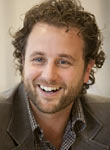Technology changes our brains but doesn't lead to idiocy
By George Lowery

Socrates resisted the alphabet, reasoning that humans would become stupid if they offloaded their memories onto parchment. Hosni Mubarak probably isn't too wild about Twitter. But the notion that today's youth are being stunted by technology-drenched lives is gaining currency.
Jeff Hancock will tackle the question, "What is technology doing to our brains?" March 13 in New York City in an hour-long lecture at One Day University.
"It does look like the media environment will change the way our brains work," said Hancock, associate professor of communication and of information science. "Brains are plastic. They adapt to the environment that they're in, but we don't know whether that will lead to necessarily positive or negative outcomes. The effects of technology are not straightforward."
Hancock said the brain can adapt to changing visual environments, and that is happening to young technology users. But he rejects the premise of a book that claims tech-savvy youngsters are rendered less-critical thinkers and poor writers by heavy Facebook, Twitter and other social media use.
"The Dumbest Generation: How the Digital Age Stupefies Young Americans and Jeopardizes Our Future (Or, Don't Trust Anyone Under 30)" by Emory University English professor Mark Bauerlein, contends that kids these days are rendered less creative by spending much of their lives interacting with machines.
"Technology is not changing our brain in a way that's leading to the dumbest generation," Hancock said. "Kids text. We know young people do more writing than any generation before them. Whether that counts as real writing is a question mark. They're also reading more. My bet is the more you read and write -- it doesn't matter what -- the more literate you'll be."
Use of tablet computers like iPads and smartphones make intuitive sense to small children, Hancock said, and "that is going to have an impact on how their brain is organized relative to an older generation, who didn't interact with technology."
Research on the phenomenon of immersion in technology shows mixed results thus far, Hancock said. Skills demanded by the workplace will also change. "Being fluent in many disciplines is going to be important. Being able to find information quickly and integrate it is going to be important. It's going to change what kind of intelligence is valued," he said.
"There's also the idea that we're going to be developing new kinds of intelligence as the technology revolution advances. In the 90s, one of the big things was being able to find information as opposed to being able to remember it. I think it's going to have different effects on our emotions and types of intelligence."
This will be Hancock's second appearance at One Day University. "I enjoy teaching people who are hungry for intellectual stimulation," Hancock said. "They reminded me of freshmen; they were very keen, very attentive."
Cornell alumni can attend a day of lectures -- including Cornell law professor Faust Rossi's "Should the First Amendment Protect Everyone?" -- from top-rated professors at the nation's best schools for less than half the usual price by entering the coupon code "BIGRED" at http://www.onedayu.com.
Cornell's New York City Communications office began a partnership with One Day University in 2009.
Media Contact
Get Cornell news delivered right to your inbox.
Subscribe